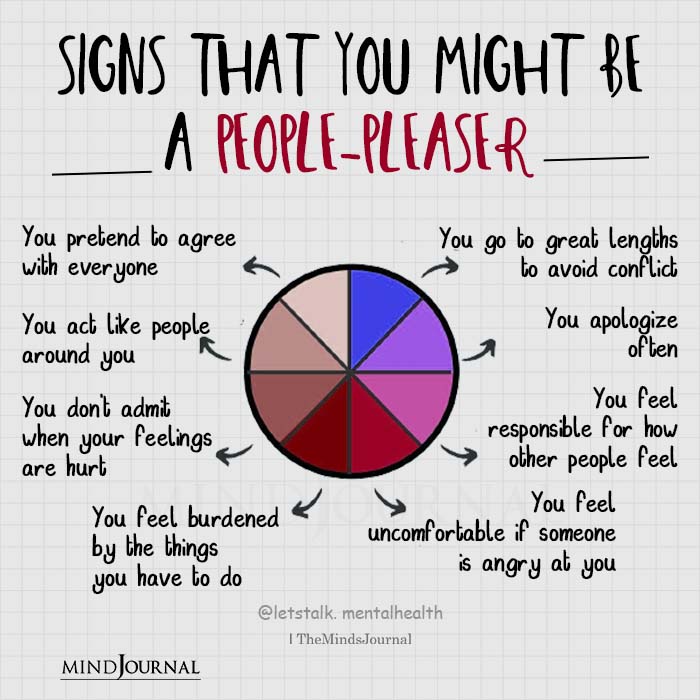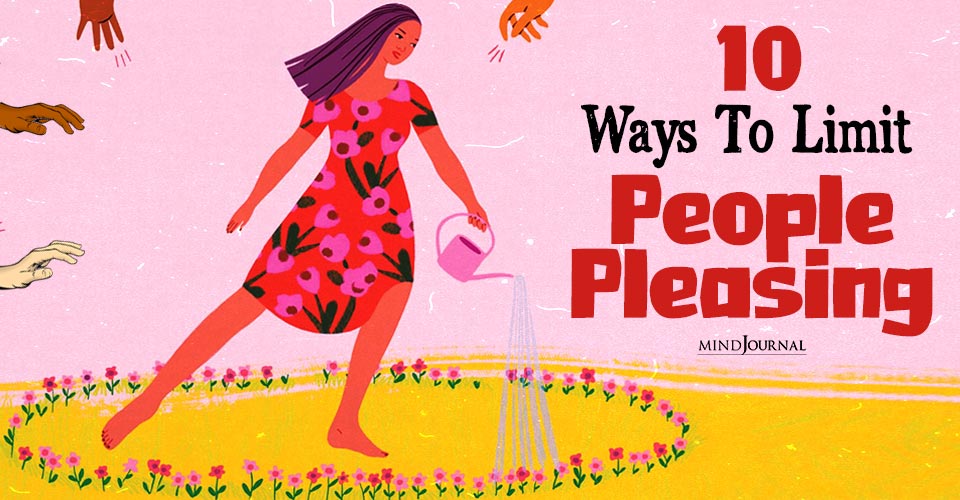“People pleasing is really fearing people’s reactions, rejection or abandonment.” – Tracy A Malone
Key Points:
- People pleasing often starts in childhood, when someone doesn’t have, or doesn’t give themselves, permission to put themselves first.
- Valuing others more than oneself delegates reinforcement of one’s worth to the outside world.
- People pleasers tend to be over-observant of micro-expressions and verbal nuances in others.
- To avoid people pleasing at work, one can stop overcompensating and feeling responsible for mistakes made by coworkers.
We’re all susceptible to the effects of the people pleasing syndrome—children, teens, adults, and parents. Psychologist and author Harriet B. Braiker referred to people pleasing in her book, Disease to Please (2002). She noted, “People often say ‘yes’ when they’d rather say ‘no,’ setting off many problems.” For them, the uncontrollable need for the elusive approval of others is like an addiction.
Statistically, people pleasing behavior is more prominent in women than men. A 2010 study showed that 54 percent of women are suffering greater adverse effects on both mental and physical health from people pleasing behaviors, compared to 40 percent of men.
People pleasing often starts in childhood when we don’t give ourselves permission to please or put ourselves first. By valuing others more than ourselves, we delegate reinforcement of our worth to the outside world, which is unreliable and makes prolonged validation fleeting.
I’ve developed a handful of tips to help people mindfully address reducing this behavior at home and work. If you’re able to practice them, you should experience noticeable improvement, without risking relationships you’ve built with a desire to be of service.
Related: What Is Social Chameleon Personality? 7 Key Signs to Watch Out For
5 Tips to Stop People Pleasing at Home
Reducing people pleasing at home can improve personal and family relationships by reducing resentment and feelings of being underappreciated.
1. Don’t offer unsolicited advice, guidance, or problem-solving strategies unless you’re specifically asked. We engage in these behaviors to secure a feeling of indispensability for the relationship. However, if guidance is ignored, it can create frustration and resentment.
2. Practice not saying yes when you want to say no. When you offer to do things you don’t want to, it can lead to a lack of follow-through. This creates internal tension, decreasing self-respect, as well as relationship problems.

3. People pleasers are over-observant of micro-expressions and verbal nuances. Avoid overthinking or personalizing interactions. Exercise patience to wait and see if anything is wrong. Practice developing alternative scenarios that verify what you saw that has nothing to do with you. Exercise frustration tolerance to avoid security check-ins before making assumptions.
4. Unburden yourself from feeling responsible for curating other people’s enjoyable time. Feeling responsible for other people’s happiness impedes our own satisfaction. We need to be capable and responsible as individuals for our own personal contentment and see others in the same light.
5. If you’re becoming resentful or feel taken advantage of by others, give yourself permission to communicate transparently. It’s the best way to preserve relationships. Use “I” statements to ensure you’re taking responsibility for feeling resentful and not externalizing blame on someone else for your feelings.
If you believe people want to be around you for who you are, and not what you can do for them, you will develop a stronger belief in your inherent lovability.
Related: 11 Things People Pleasers End Up Doing Unintentionally
5 Tips to Stop People Pleasing at Work
Challenging people pleasing behaviors at work is an essential tool in preventing and projecting a secure work image.
Looking and feeling self-confident and self-assured yields positive work empowerment. It should also improve job performance, increase feelings of self-worth, and put you on a path to satisfy your goals for success.
1. Be honest with yourself and avoid overselling yourself to prove your worth to a client or supervisor. Trust and believe in your own value instead of trying to over-please. Trying to over-please a supervisor can backfire. It can adversely affect their view of you and lower your self-respect as well.
2. Only apologize once for making a mistake. We can’t please people all the time. We’re humans, not robots. Errors are unintentional. Growth comes from errors. Don’t punish yourself for them.
3. Unburden yourself from overcompensating and feeling responsible for mistakes made by other people or coworkers. However, learn from their mistakes in the same way you would learn from your own.
4. Stem the impulse of anticipating someone else’s needs or jumping in to do their work—unless it’s requested. You may feel you’re being kind and generous, but if it’s not reciprocated later, it can fuel resentment.
5. Pause before engaging in activities that may look or feel you’re ingratiating yourself to others to assert your value. You might not want to be the one who’s always organizing the office “Happy Hour” or bringing in pastries. Allowing someone else to engage in actions that benefit you and others will help to develop more self-worth and confidence.
Honestly believing that people want to be with you because of who you are, and not because of the service you offer, helps to build a core building block and foundation in your relationships. It will improve your self-confidence and feelings of lovability and lead to more sustainable satisfaction in your life.
Want to know more about how to stop people pleasing? Check this video out below!
The print version of Dr. Jennifer Guttman’s debut as an author, Beyond Happiness, The 6 Secrets Of Lifetime Satisfaction will be published by Post Hill Press on May 30, 2023. Pre-order link http://posthill.to/1637587945. You can also pre-order her book at Barnes & Noble – https://www.barnesandnoble.com/w/beyond-happiness-jennifer-guttman-psyd/1142978001
References:
Robert F. Kusher and Seung W. Choi, (June 2010), "Prevalence of Unhealthy Lifestyle Patterns Among Overweight and Obese Adults, National Library of Medicine, Pub.Med
Written By Jennifer Guttman Psy.D. Originally Appeared On Psychology Today











Leave a Reply